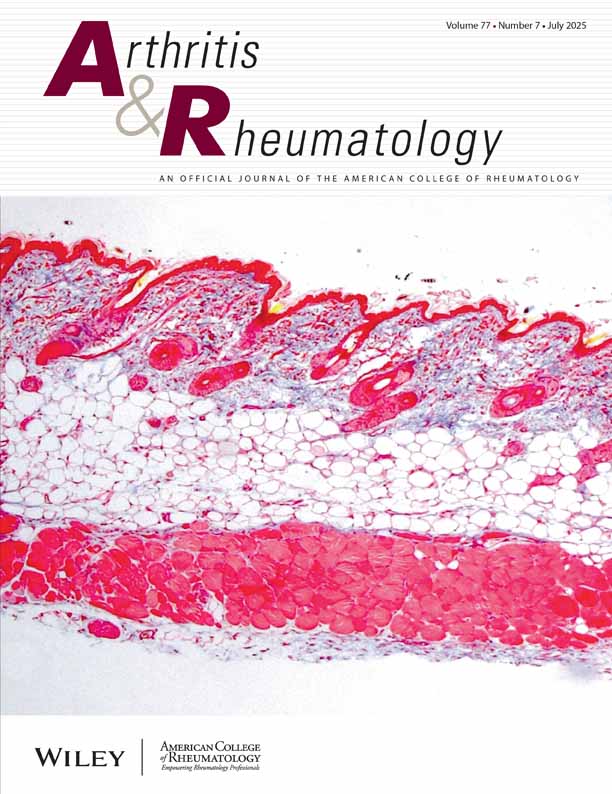Autoantibodies to fibrillin 1 in systemic sclerosis: Ethnic differences in antigen recognition and lack of correlation with specific clinical features or HLA alleles
Abstract
Objective
We previously reported the presence of autoantibodies to the extracellular matrix protein, fibrillin 1, in sera from patients with systemic sclerosis (SSc). These autoantibodies appeared to be highly disease-specific but had significantly different frequencies among ethnic groups. The aims of this study were 3-fold: 1) to determine whether sera from SSc patients of different ethnic backgrounds recognized different antigenic epitopes of fibrillin 1, 2) to determine whether sera from patients with polymyositis/dermatomyositis (PM/DM) with or without interstitial lung disease (ILD) also produced these antibodies, and 3) to determine any correlation of anti–fibrillin 1 antibodies with specific clinical features of SSc, other autoantibodies, or HLA class II alleles in a prospectively studied cohort of SSc patients with early (<5 years' duration) disease (the Genetics versus Environment In Scleroderma Outcome Study [GENISOS] cohort).
Methods
Three recombinant peptides accounting for the N-terminal end, proline-rich C region, and epidermal growth factor–like calcium-binding (EGF-cb) domains of fibrillin 1 were used in a radioimmunoassay to screen sera from a large group of SSc and PM/DM patients and ethnically matched controls.
Results
The majority of Choctaw American Indians, Japanese, and African Americans with SSc produced IgM and/or IgG autoantibodies to one or more recombinant fibrillin 1 proteins, while <50% of Caucasians with SSc showed seroreactivity. There were striking ethnic differences in fibrillin 1 antigenic epitope recognition among these ethnic groups. African American SSc sera recognized primarily the N-terminal end, and Caucasian sera mostly recognized the EGF-cb repeats and the proline-rich C region. In contrast, most Choctaw American Indian and Japanese SSc sera appeared to recognize 2 or 3 epitopes, respectively. PM/DM patient sera did not recognize any of the fibrillin 1 epitopes regardless of the presence of ILD. In the prospective, multiethnic GENISOS cohort, the presence of anti–fibrillin 1 antibodies did not correlate with any major clinical manifestations, other autoantibodies, or HLA class II alleles.
Conclusion
There are striking ethnic differences in antigenic epitope specificity of anti–fibrillin 1 antibodies in patients with SSc, and the majority of SSc patients, except for Caucasians, produce antibodies to fibrillin 1. The antifibrillin response thus far remains specific for scleroderma syndromes, but it does not correlate with any major clinical features, other autoantibodies, or HLA class II alleles.




